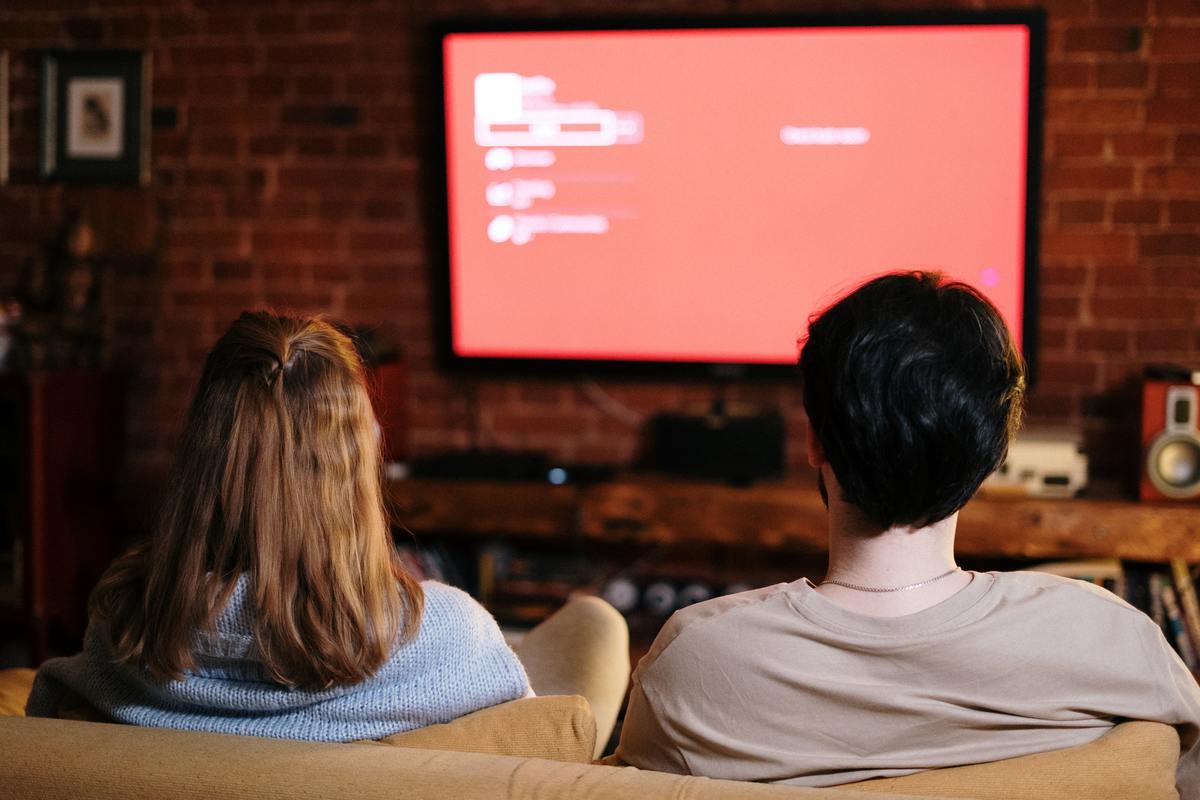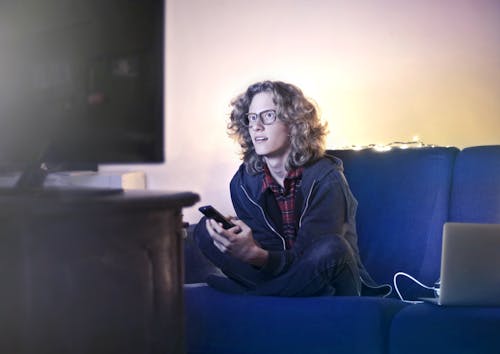
There are many reasons why TV addiction is so harmful to your health. Being too sedentary for too many hours of the day, excess screen time and a lack of productivity are just some of the consequences of being addicted to TV.
TV addiction may not sound as severe as an alcohol addiction or drug addiction, and the DSM doesn’t even recognize it as a formal condition, but it’s still very serious.
Unfortunately, although a TV addiction should be taken seriously, it’s become somewhat normalized. Exchanging opinions with others about what went down on the latest episode of a series, and the newly-coined pop term “binge-watching” have made TV indulgence an “in thing.”
However, according to research, TV addiction eerily shares characteristics to substance addiction. TV addicts engage in a behaviour excessively to escape, to control or cope, or to lessen tension. Physiologically you feel a rush of dopamine released from your brain, which acts like a reward and makes you continue to engage in the behaviour.
How to Decipher if You Have a TV Addiction
We’ve all been there from time to time when it comes to an over-indulgence of TV shows. That Saturday you spent watching back-to-back episodes of The Office or Grey’s Anatomy all day long doesn’t indicate that you’re addicted if binge-watching isn’t a regular pattern of behaviour for you.
So how do you know when it’s a problem? How do you know when you’re a TV addict who needs to make some serious changes?
The keyword is excessive. Yes, excessive TV consumption is what you need to be cognizant of. It’s not just about tracking the specified number of hours you engage your TV addiction. It’s also about the behaviour interfering with your daily functioning.
Let’s look at some ways to determine if your TV watching is actually an addiction:
- You regularly watch much more TV than you intend to
- You feel upset, irritable, or anxious when you can’t watch TV
- You watch TV in order to feel better
- Your to-do list keeps getting delayed, put off and forgotten about because you’re watching TV (productivity concerns)
- You’re becoming less social and seeing friends less because you’d rather stay home and watch TV
- You develop health concerns
- You have a hard time cutting back
- You need more of TV watching to get the same feeling (tolerance)
- You will continue to watch TV for a longer time or more than you had initially planned
- You always feel the need to watch TV and have often tried to stop unsuccessfully
- You spend a lot of time using and recovering from watching TV
- You stop spending time on important things and people in your life/you notice problems in your personal relationships
- You keep on watching TV even though it’s becoming detrimental to your life
Do 3 or more of the above resonate with you to some extent?

Who is More Likely to Struggle with a TV addiction?
While anyone can experience addiction, it’s fairly logical to assume that certain circumstances or characteristics can cause a higher likelihood that you become addicted. Your mental health can play a significant role.
TV can keep you company if you are lonely, anxious, or depressed, and you just want to escape. If you have an addictive personality and typically approach things with an all or nothing mentality, then this can pave the way for TV addiction.
If you’re a loner, suffer from social anxiety, tend to avoid the outside world, or are an avoidant attached type, then staying home and watching TV all day and/or night may be all too easy for you.
A night owl or one who suffers from delayed sleep phase disorder and whose body clock is out of whack (a circadian rhythm disorder) can have you awake until the wee hours of the morning, and while the rest of the world is asleep, you satisfy your boredom by streaming TV.
Maybe you’re an entrepreneur who has too much free time so you just squander the majority of the day away in front of the TV.
While we can’t place blame on Netflix or Hulu for a TV addiction, we can acknowledge that the availability of full series makes it easier than ever to keep hitting “next”. The bts TV Gods’ ploy of having an episode end with one big open loop can easily make you keep going because of your innate desire for catharsis and the need to know, to solve a puzzle or problem.
Why Watching Hours and Hours of TV is Bad for Your Health
Side effects of excessive TV watching can range from negative body outlook among women, problems shutting down to sleep, ADHD, and the natural effects of being sedentary for too long such as obesity and not engaging in enough physical activity.
Which all begs the question – what can you do to break this bad habit?
As with any addiction, the first step is awareness, to acknowledge that you have a problem – after all, denial won’t get you moving away from your screen anytime soon.
The next step is to realize that you are powerless to it so far, meaning that you’ve tried to cut back or stop watching TV and you haven’t been successful in doing so.
That’s okay – there is hope.
The key is to replace your addiction with healthier, more purposeful ways to invest your time and energy, which means different things to different people. You can’t advise an introvert to go out dancing much like you can’t tell a night owl to crawl into bed at 9 pm with the hopes of falling asleep.
Strategies To Combat TV Addiction: Being Able to Hit “Pause” or “Stop”
The most obvious way to combat an addiction is to try keeping track of exactly when and the amount of time you spend watching each day (which ties into awareness).
Similar to how logging what you eat and keeping a food diary helps you with your diet, logging your TV hours helps you develop the awareness you need to make changes. Writing down on paper that you spent 4 or 6 hours watching TV can jolt you into realizing how much time you are wasting each day, which can prompt the need for change.
This will also help you note things like patterns around when you generally watch TV. For instance, if you notice that you always turn on the TV as soon as you come home from work or right after dinner, then you might choose to do something else instead like go for a walk or grab a good book.
When you have too much free time…
If you are one of those who has quite a lot of free time, then the important thing is to fill it with activities.
Scheduling blocks of time to spend with friends, family, or engaging in physical activity can easily take your mind off of screen time. You may find it easier to commit to these activities by putting them on your calendar
If you’re watching TV because you’re a night owl or have a sleep disorder…
Lots of people come alive at night or have trouble sleeping. Then this is the ideal time to do some work or prepare for work the next day – especially if you’re late nights = late or unproductive mornings.
Maybe do some journaling and goal-setting, coloring, or painting. Take a long bath or immerse yourself in a good book.
If your messy room or cupboards are bugging you, plan out some nights to clean or organize them.
Why not finally dig into that recipe or go for a drive if you feel like busting out of the house?

You turn to TV because you’re introverted or don’t want to leave the house due to social anxiety…
I resonate personally with this one. As a self-proclaimed and proud introvert, I’m a homebody and do not benefit much from spending long periods of time in social situations. The only way I recharge is alone – I thrive on it.
Maybe for you, it’s to the extent that you have social anxiety or just avoid close relationships with anyone.
In this case, you need to pull away from the TV by engaging in an activity where you feel comfortable. After you put down or hide the remote, read or teach yourself a new language with apps like Duolingo, or do a puzzle.
Try a new takeout place or prepare a comforting meal. Create a space for exercising by hopping on your treadmill or doing some yoga.
If it’s the evening or nighttime and the temptation is to stream TV, then why not just go to bed earlier instead? My personal favorite thing to do is throw on my PJs, brush my teeth (so I avoid munching [more] in bed), grab a book or notebook, and head for the bedroom. I’ve made it a nice little pre-slumber ritual that I’ve come to love and look forward to. I find that I sleep better and wake up earlier, feeling fresh and ready for the day ahead.
When TV is your escape from your depression, anxiety, or loneliness
The key here is to occupy your time and feel connected. Dr. Hassan Ali, a clinical psychologist, says, “Try to remove the source by going to a local coffee shop with a good book and no access to TV.”
Find some Meetup groups to join or start your own. Volunteer, or participate in a group activity. You can explore your city or a new one, or enjoy nature by going for a hike, gardening, or visiting your local park.
It’s important to make time for meaningful connections with others, even if it’s a quick coffee or lunch date.
If you find that you’re using TV as a way to avoid stress or dealing with a certain problem, then you may want to discuss this with a friend, family member, or therapist.
The Bottom Line
“Human beings are teleological creatures. We are hard-wired to live purposefully, to have direction. Without a target to shoot at, our lives are literally aimless. Without something productive to do, without positive goals and a purpose, a human being languishes. And then one of two things happens. Aimlessness begins to shut a person down in spiritual lethargy and emptiness, or the individual lashes out and turns to destructive goals just to make something happen.” The Art of Achievement, Tom Morris
No matter your reason for overindulging in TV, create a vision board of your life, or if you’re a bullet point lover like me, make a list of what you want your life to look like. When you feel a deep sense of purpose (the plan) and that you have a mission in life (the how or doing), it’s much easier to let go of anything that distracts or takes time or energy unnecessarily away from it, like watching TV.
Addictive behavior is often genetic. If you’d like to find out what you’re genetically more likely to be addicted to, take the CircleDNA at-home DNA test.







Comments are closed.